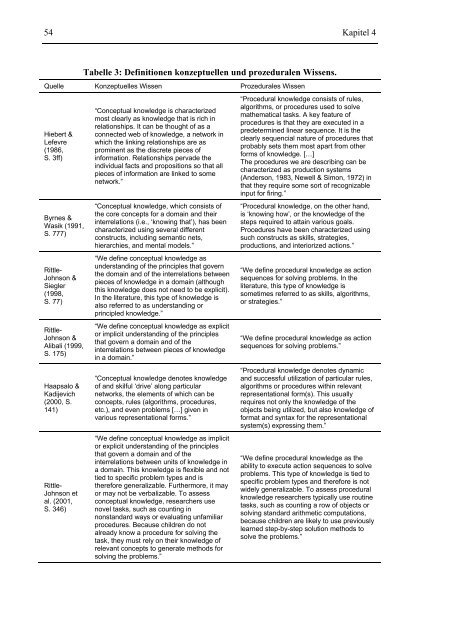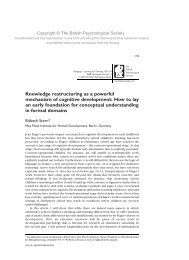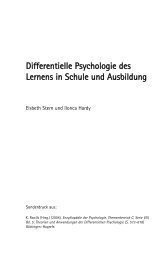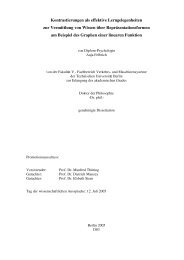Konzeptuelles und prozedurales Wissen als latente Variablen: Ihre ...
Konzeptuelles und prozedurales Wissen als latente Variablen: Ihre ...
Konzeptuelles und prozedurales Wissen als latente Variablen: Ihre ...
Erfolgreiche ePaper selbst erstellen
Machen Sie aus Ihren PDF Publikationen ein blätterbares Flipbook mit unserer einzigartigen Google optimierten e-Paper Software.
54 Kapitel 4<br />
Tabelle 3: Definitionen konzeptuellen <strong>und</strong> prozeduralen <strong>Wissen</strong>s.<br />
Quelle <strong>Konzeptuelles</strong> <strong>Wissen</strong> Prozedurales <strong>Wissen</strong><br />
Hiebert &<br />
Lefevre<br />
(1986,<br />
S. 3ff)<br />
Byrnes &<br />
Wasik (1991,<br />
S. 777)<br />
Rittle-<br />
Johnson &<br />
Siegler<br />
(1998,<br />
S. 77)<br />
Rittle-<br />
Johnson &<br />
Alibali (1999,<br />
S. 175)<br />
Haapsalo &<br />
Kadijevich<br />
(2000, S.<br />
141)<br />
Rittle-<br />
Johnson et<br />
al. (2001,<br />
S. 346)<br />
“Conceptual knowledge is characterized<br />
most clearly as knowledge that is rich in<br />
relationships. It can be thought of as a<br />
connected web of knowledge, a network in<br />
which the linking relationships are as<br />
prominent as the discrete pieces of<br />
information. Relationships pervade the<br />
individual facts and propositions so that all<br />
pieces of information are linked to some<br />
network.”<br />
“Conceptual knowledge, which consists of<br />
the core concepts for a domain and their<br />
interrelations (i.e., ‘knowing that’), has been<br />
characterized using several different<br />
constructs, including semantic nets,<br />
hierarchies, and mental models.”<br />
“We define conceptual knowledge as<br />
<strong>und</strong>erstanding of the principles that govern<br />
the domain and of the interrelations between<br />
pieces of knowledge in a domain (although<br />
this knowledge does not need to be explicit).<br />
In the literature, this type of knowledge is<br />
<strong>als</strong>o referred to as <strong>und</strong>erstanding or<br />
principled knowledge.”<br />
“We define conceptual knowledge as explicit<br />
or implicit <strong>und</strong>erstanding of the principles<br />
that govern a domain and of the<br />
interrelations between pieces of knowledge<br />
in a domain.”<br />
“Conceptual knowledge denotes knowledge<br />
of and skilful ‘drive’ along particular<br />
networks, the elements of which can be<br />
concepts, rules (algorithms, procedures,<br />
etc.), and even problems […] given in<br />
various representational forms.”<br />
“We define conceptual knowledge as implicit<br />
or explicit <strong>und</strong>erstanding of the principles<br />
that govern a domain and of the<br />
interrelations between units of knowledge in<br />
a domain. This knowledge is flexible and not<br />
tied to specific problem types and is<br />
therefore generalizable. Furthermore, it may<br />
or may not be verbalizable. To assess<br />
conceptual knowledge, researchers use<br />
novel tasks, such as counting in<br />
nonstandard ways or evaluating unfamiliar<br />
procedures. Because children do not<br />
already know a procedure for solving the<br />
task, they must rely on their knowledge of<br />
relevant concepts to generate methods for<br />
solving the problems.”<br />
“Procedural knowledge consists of rules,<br />
algorithms, or procedures used to solve<br />
mathematical tasks. A key feature of<br />
procedures is that they are executed in a<br />
predetermined linear sequence. It is the<br />
clearly sequencial nature of procedures that<br />
probably sets them most apart from other<br />
forms of knowledge. […]<br />
The procedures we are describing can be<br />
characterized as production systems<br />
(Anderson, 1983, Newell & Simon, 1972) in<br />
that they require some sort of recognizable<br />
input for firing.”<br />
“Procedural knowledge, on the other hand,<br />
is ‘knowing how’, or the knowledge of the<br />
steps required to attain various go<strong>als</strong>.<br />
Procedures have been characterized using<br />
such constructs as skills, strategies,<br />
productions, and interiorized actions.”<br />
“We define procedural knowledge as action<br />
sequences for solving problems. In the<br />
literature, this type of knowledge is<br />
sometimes referred to as skills, algorithms,<br />
or strategies.”<br />
“We define procedural knowledge as action<br />
sequences for solving problems.”<br />
“Procedural knowledge denotes dynamic<br />
and successful utilization of particular rules,<br />
algorithms or procedures within relevant<br />
representational form(s). This usually<br />
requires not only the knowledge of the<br />
objects being utilized, but <strong>als</strong>o knowledge of<br />
format and syntax for the representational<br />
system(s) expressing them.”<br />
“We define procedural knowledge as the<br />
ability to execute action sequences to solve<br />
problems. This type of knowledge is tied to<br />
specific problem types and therefore is not<br />
widely generalizable. To assess procedural<br />
knowledge researchers typically use routine<br />
tasks, such as counting a row of objects or<br />
solving standard arithmetic computations,<br />
because children are likely to use previously<br />
learned step-by-step solution methods to<br />
solve the problems.”





